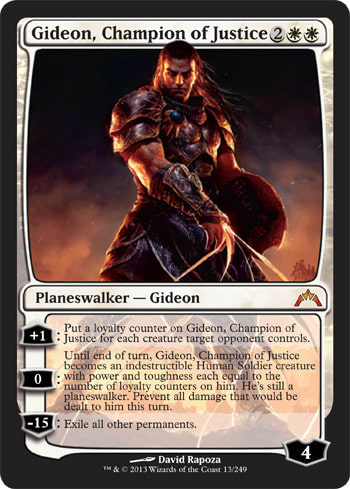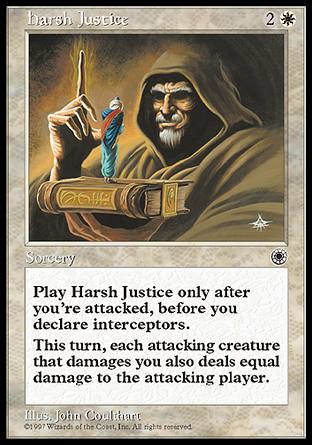Do a few searches for Gideon, Champion of Justice, and you’ll quickly find a lot of disagreement about this planeswalker. I’d like to argue that Magic needs Gideon, Champion of Justice—but for reasons beyond his abilities on the card. We need Gideon, Champion of Justice because deep down, all of us have a need to see justice in the world. It’s a part of our worldview, and it’s what makes Gideon’s role in the story of the game so crucial.
First, here’s a brief definition of justice:
2) Fairness
3) Rightfulness
4) Reward or penalty as deserved
5) The use of authority to uphold the law1
In short, justice is all about fairness and issuing appropriate punishment to those who act unfairly. Justice is something we seek without thinking about it. This inclination toward fairness is larger than Magic and has a significant bearing on the game.
But how do we know the need for justice is within us? As a writer, I look first to stories when asking existential questions. Let’s take a look at some of the stories we tell ourselves and see what they say.
Justice in Our Popular Stories
The need for justice can most obviously be seen in modern American comic books. It is a medium filled with larger-than-life heroes fighting injustice no matter the cost. As Stan Lee made famous in Spider-Man comic books, “With great power comes great responsibility.” But responsibility to do what? Seek justice. Spidey, Supes, and Bats aren’t out fighting evil because they necessarily enjoy it (okay, Bats might enjoy it a little bit), but because it must be done.
We also see the need for justice played out on primetime television every night. Just pick your favorite network and watch a cop show. Series such as “Law & Order,” “CSI,” “Castle,” “Bones,” “Fringe,” and even “Psych” all assume that their viewers will want to see wrong things made right. Without our inherent need for justice, we might all be watching even more shows like “Jersey Shore” or “The Bachelor” (which is an apocalyptic future worse than anything even J.J. Abrams could dream up).
The rise of the anti-hero in pop-culture stories is another indicator that we crave justice. In the last fifty or more years, our culture has moved away from the glowing 1950s, in which the Cleavers performed idyllic morality in a black-and-white world. Now we live in a time when it’s commonplace to see justice played out in our stories by unstable, vengeful, and even corrupt characters: comic book heroes like Wolverine with his berserker rage; TV characters like Dexter, who leads a double-life of crime-fighting and serial killing; and Jason Statham’s character in “The Expendables.” (Watch this scene from “The Expendables” and see a quintessential example of the anti-hero: one who enacts justice with over-aggressive violence and fear mongering.)
So, our pop-culture stories demonstrate our need for justice. Now it’s time for some stronger proofs.
Justice in Real Life
The origin of justice has been debated for centuries.2 Some believe it is a social construct—that those in power determine what justice is. Others believe it is a natural part of our humanity—that we are born with a natural code of fairness within us (presumably given by a divine being or by some other means).
For example, if you’re from the Judeo-Christian religious tradition, you might trace the need for justice back to The Ten Commandments3 or numerous other verses in the Old Testament.4 If you’re a Buddhist, you probably believe in Karma, seek equality, and value personal responsibility.5 Some atheists also believe in justice.6
Even if you’re just simply an American, you could trace an inner desire for justice back to the U.S. Constitution.7 Having grown up in a country shaped by this document, you’ve probably inherited some of its ideas about justice.
For the sake of space, I can’t do a full survey of every religion or country’s views on the origin of justice. But regardless of where you believe justice came from or why you believe it’s important, it’s hard to argue with the notion that almost all of us have an unspoken inclination to see justice, fairness, and equality in the world. These ideals inform why we can appreciate this new version of Gideon. (And speaking as a Vorthos-minded player, they can inform how we can build decks around him, too.)
Justice in the Multiverse
Back to Gideon: Why does Magic need him? Because we play a game filled with demons and blood-sucking vampires and inhabited by a guild/cult that celebrates senseless violence. Because we play a game in which Lord of the Pit is still one of the community’s favorite cards. And because we play a game in which bad guys like the Phyrexians actually win. (By the way, if you don’t think the Phyrexians are really all that bad, read Robert Wintermute’s The Quest for Karn, and you’ll learn how disgusting they really are. By the end of that book, I was so sickened by the vile nature of Phyrexians that I didn’t even want to look at the cards. Seriously. They are a truly twisted, evil race of monsters.)
Magic needs a champion of justice. The stories that give our game its life need a hero who campaigns for what is right simply because it’s right. Magic needs a hero with his own lawkeeper and avenger. Ajani, Caller of the Pride and Elspeth, Knight-Errant can’t do it alone—not when the most powerful planeswalker in the multiverse is an egocentric, half-crazed, brilliant-beyond-reason, maniacal dragon. (With him running around unchecked, it’s a wonder more planes haven’t been broken into shards by now.) Gideon, Champion of Justice is a sorely needed hero in a very dark place.
To that end, I’ve constructed this justice-infused deck:
"Let Justice Roll Down"
- Creatures (18)
- 1 Hero of Bladehold
- 1 Pilgrim of Justice
- 2 Field Marshal
- 3 Daru Warchief
- 3 Precinct Captain
- 4 Gideon's Avenger
- 4 Gideon's Lawkeeper
- Planeswalkers (4)
- 4 Gideon, Champion of Justice
- Spells (14)
- 1 Dispense Justice
- 1 Righteous Blow
- 1 Swift Justice
- 2 Disenchant
- 2 Harsh Justice
- 1 Decree of Justice
- 3 Gaze of Justice
- 1 Murder Investigation
- 2 Karmic Justice
- Lands (24)
- 17 Plains
- 2 Daru Encampment
- 2 Secluded Steppe
- 3 Sejiri Steppe
Gideon, Champion of Justice is the obvious hero of this deck. Gideon's Lawkeeper will help protect him from nasty threats while it combos with Gideon's Avenger to create a nasty threat of its own. Should your opponent try to play Bramblecrush, Beast Within, or any other permanent-destroying spells against Gideon, you have Karmic Justice on hand to make sure the loss is felt on the opponent’s side of the table, too.
Like Gideon Jura, Gideon, Champion of Justice fits well in a Soldier deck. Solider lords Daru Warchief and Field Marshal are obvious choices to combo with him and the battalion of other Soldier creatures this deck is running. I like Field Marshal because of its cheap mana cost, and I like Daru Warchief because it makes all your Soldiers cheaper and stronger. I could also see swapping in a copy or two of Rhox Pikemaster and—as along as the mana curve didn’t become too cumbersome—a copy of Captain of the Watch.
I put both Dispense Justice and Pilgrim of Justice into this deck because they’re on theme. They’re also the first two cards I would sideboard out because of the conditional nature of their abilities. Though it is completely off theme for a Gideon/justice deck, Tezzeret's Gambit is a great card to fill their spots. Not only does it provide you with card advantage, but it helps the counters on Gideon and Gideon's Avenger climb into the stratosphere pretty quickly.
I put in three copies of Gaze of Justice because it is such a strong removal spell. Murder Investigation, Decree of Justice, Precinct Captain, and Hero of Bladehold will create the extra creatures you need to be able to cast it. However, if the additional casting cost just becomes too expensive to be useful, you could easily swap in cards such as Smite, Righteous Blow, Stave Off, and Swords to Plowshares in its place (and still be on theme with any of them). Though the converted mana cost is different, one of my favorite surprises in this deck is Harsh Justice. You could also swap in more of those if needed.
Hero of Bladehold is obviously a powerful card that demands more attention in a Soldier deck than in this one. I only included one copy because I want to keep Gideon, Champion of Justice as the deck’s hero and Gideon's Avenger as the probable win condition. Your opponents will probably focus on eliminating Gideon, his pesky lawkeeper, or the Daru Warchief, while the Avenger steadily grows and becomes a game-ending threat.
I included twenty-four land cards to ensure that you get online quickly and avoid mana problems. Others may want to cut one or two lands. Daru Encampment is yet another boost to your Soldiers. Secluded Steppe adds some cycling to the deck for when you have enough mana. Sejiri Steppe is meant to protect your creature lords, Gideon's Lawkeeper, and especially Gideon's Avenger.
Sometimes Even the Just See Red
I anticipate Gideon, Champion of Justice is going to see a lot play in Boros decks for years to come. There’s a whole slew of red spells from Magic’s history that combo well with him, and there are many that seek justice—albeit in a more chaotic fashion.
"Let Justice Roll Down – Boros Edition"
- Creatures (18)
- 1 Boros Swiftblade
- 1 Soltari Guerrillas
- 2 Field Marshal
- 2 Hearthfire Hobgoblin
- 4 Daru Warchief
- 4 Gideon's Avenger
- 4 Gideon's Lawkeeper
- Planeswalkers (4)
- 4 Gideon, Champion of Justice
- Spells (14)
- 1 Disenchant
- 1 Harsh Justice
- 1 Swift Justice
- 2 Arrows of Justice
- 2 Boros Charm
- 1 Decree of Justice
- 1 Gaze of Justice
- 1 Mob Justice
- 1 Primitive Justice
- 1 Murder Investigation
- 2 Karmic Justice
- Lands (24)
- 10 Plains
- 7 Mountain
- 2 Daru Encampment
- 2 Rupture Spire
- 3 Sejiri Steppe
I won’t go into the details of how this deck works. I’m sure many others will be building Boros/Soldier decks that feature Gideon, Champion of Justice. If you’re one of those people, what would you change about this deck? (Remember to keep it on theme.)
I think it’s only appropriate to end this article with a quote from a real-life champion of justice:
– Martin Luther King, Jr., “Letter from a Birmingham Jail”
1 Webster’s New World Dictionary. Michael Agnes, Ed. Wiley Publishing, 2003.
2 See this paper from the Social Science Research Network: “David Hume vs. Thomas Reid: Is Justice Socially Constructed or Natural?”
3 The Ten Commandments are found in Exodus 20:1–17. Verses 13–17 focus on moral issues that imply it is unfair to take or harm what is not yours.
4 Exodus 23:2; Exodus 23:6; Leviticus 19:15; Deuteronomy 16:19–20
5 See Basic Buddhist Beliefs
6 For an argument for justice see Greta Christina, “Why Atheism Demands Social Justice.” For various discussions about justice see the forums at Atheist Nexus.
7 See the first reason given for writing the Constitution: “We the People of the United States, in Order to form a more perfect Union, establish Justice, insure domestic Tranquility, provide for the common defense, promote the general Welfare, and secure the Blessings of Liberty to ourselves and our Posterity, do ordain and establish this Constitution for the United States of America.”























